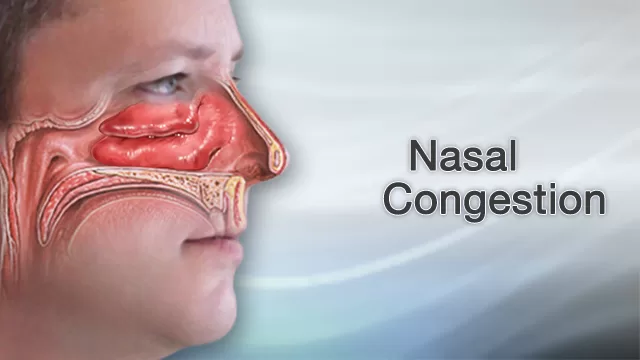Nasal congestion, also known as a stuffy nose, is a condition in which the nasal passages are blocked or swollen, making it difficult to breathe through the nose. This can be caused by allergies, infections, or irritants like smoke or pollution, among other things. Most people with nasal congestion have trouble breathing through their nose, feel pressure or fullness in their face or head, and have a buildup of mucus in their nasal passages.
Other symptoms may include sneezing, coughing, sore throat, or headache. Nasal congestion can be uncomfortable and frustrating, but it is usually not serious and can often be treated at home with over-the-counter medications or home remedies. However, if symptoms persist or are accompanied by severe pain or fever, it is important to seek medical attention.

Is nasal congestion and Sinusitis are same
Nasal congestion and sinusitis are related, but they are not the same thing. Nasal congestion is a symptom that can occur as a result of many conditions, including allergies, colds, and sinus infections. It is characterized by a stuffy or blocked nose that makes it difficult to breathe through the nostrils.
Sinusitis, on the other hand, is a condition that occurs when the sinuses become inflamed or infected. The sinuses are air-filled spaces located in the bones of the face and skull, and when they become blocked, they can become infected with bacteria or viruses, leading to sinusitis. Symptoms of sinusitis can include nasal congestion, facial pain or pressure, headache, fever, and thick, discolored nasal discharge.
In short, nasal congestion is a symptom that can be caused by many different conditions, while sinusitis is a specific condition that involves inflammation or infection of the sinuses. However, nasal congestion is a common symptom of sinusitis. If you are experiencing persistent or severe nasal congestion, it is important to consult a healthcare professional to determine the underlying cause and appropriate treatment.
What are the home remedies for sinusitis and nasal congestion
There are several home remedies that can help relieve the symptoms of sinusitis and nasal congestion. Here are some examples:
Steam inhalation:
Breathing in steam can help to moisten and clear out the nasal passages. You can do this by standing in a hot shower, inhaling steam from a bowl of hot water, or using a humidifier.
Saline nasal rinse:
Using a saline solution to rinse out the nasal passages can help to flush out mucus and irritants. You can buy a saline nasal rinse kit at a pharmacy or make your own solution at home by mixing 1 teaspoon of salt with 2 cups of warm water.
Stay hydrated:
Drinking plenty of fluids can help to thin out mucus and keep the nasal passages moist.
Apply warm compresses:
Placing a warm, damp cloth over your face can help to relieve sinus pain and pressure.
Avoid irritants:
Try to avoid things that can irritate your nasal passages, such as cigarette smoke, air pollution, and strong perfumes.
Use over-the-counter remedies:
Over-the-counter medications such as decongestants and pain relievers can help to relieve sinusitis symptoms. However, it is important to follow the instructions on the package and consult a healthcare professional if you have any questions or concerns.
These home remedies can be effective for mild to moderate cases of sinusitis and nasal congestion. However, if your symptoms are severe or persistent, it is important to seek medical attention to rule out any underlying conditions and receive appropriate treatment.
Is Antibiotic treatment required for the treatment of sinusitis
Not all cases of sinusitis require antibiotic treatment. In fact, most cases of sinusitis are caused by viruses and will improve on their own without antibiotics. Antibiotics are only effective against bacterial infections, and their overuse can contribute to the development of antibiotic resistance, which is a growing public health concern.
Your healthcare professional will determine if you need antibiotics based on the duration and severity of your symptoms, as well as other factors such as your age and overall health. If your symptoms have lasted for more than 10 days, are severe or worsening, or are accompanied by a high fever, your healthcare professional may consider prescribing antibiotics.
In addition to antibiotics, other treatments for sinusitis may include over-the-counter pain relievers, decongestants, nasal sprays, or prescription medications such as corticosteroids. In some cases, surgery may be necessary to treat chronic sinusitis that does not respond to other treatments.
It is important to follow your healthcare professional’s instructions regarding sinusitis treatment and take any prescribed medications as directed. If your symptoms do not improve or worsen, or if you experience any side effects from your medications, contact your healthcare professional.
How to get relief from a sinus headache and throat irritations
Here are some ways to get relief from sinus headaches and throat irritations:
- Use a humidifier: A humidifier can add moisture to the air, which can help to relieve sinus headaches and throat irritation. Be sure to clean your humidifier regularly to prevent the growth of mold and bacteria.
- Apply a warm compress: Placing a warm, damp cloth over your forehead and sinuses can help to relieve sinus headaches.
- Drink plenty of fluids: Drinking plenty of fluids can help to thin out mucus and soothe a sore throat. Water, herbal tea, and clear broths are good choices.
- Use saline nasal spray: Saline nasal spray can help to moisten and clear out the nasal passages, which can relieve sinus headaches and throat irritation.
- Take over-the-counter pain relievers: Over-the-counter pain relievers such as acetaminophen or ibuprofen can help to relieve sinus headaches and throat pain.
- Gargle with salt water: Gargling with salt water can help to soothe a sore throat and reduce inflammation. Mix 1/4 to 1/2 teaspoon of salt with 8 ounces of warm water, and gargle for 30 seconds before spitting it out.
- Avoid irritants: Try to avoid things that can irritate your sinuses and throat, such as cigarette smoke, air pollution, and strong perfumes.

If your symptoms persist or worsen despite these measures, it is important to seek medical attention to determine the underlying cause and receive appropriate treatment.
Sore throat, hoarse voice, and bad breath are common during a stuffy nose
Yes, sore throat, hoarse voice, and bad breath can be common symptoms during a stuffy nose or nasal congestion. When the nasal passages are congested or blocked, it can cause mucus to drain down the back of the throat, leading to irritation and inflammation of the throat. This can result in a sore throat, hoarseness, and even bad breath.
Additionally, nasal congestion can cause mouth breathing, which can lead to a dry mouth and a decrease in saliva production. This can create an environment in which bacteria thrive, leading to bad breath.
It is important to address the underlying cause of nasal congestion to relieve these symptoms. Home remedies such as steam inhalation, saline nasal rinse, and over-the-counter decongestants can help to clear the nasal passages and relieve congestion. If these measures do not provide relief or if the symptoms are severe, it is important to consult a healthcare professional to determine the underlying cause and receive appropriate treatment.
Can sinus infections be prevented or avoided?
While it may not be possible to completely prevent sinus infections, there are steps you can take to reduce your risk of developing them:
- Practice good hand hygiene: Wash your hands frequently with soap and water, especially during cold and flu season.
- Avoid close contact with people who have colds or other upper respiratory infections.
- Keep your home and workplace clean: Regularly clean surfaces that are frequently touched, such as doorknobs, light switches, and keyboards.
- Use a humidifier: Keeping the air moist can help to prevent the drying out of the nasal passages and reduce the risk of infection.
- Stay hydrated: Drinking plenty of fluids can help to keep the mucus in your sinuses thin and flowing.
- Avoid irritants: Try to avoid things that can irritate your sinuses, such as cigarette smoke, air pollution, and strong perfumes.
- Manage allergies: If you have allergies, taking steps to manage them can help to reduce your risk of developing sinus infections.
It is important to seek medical attention if you experience symptoms of a sinus infection, such as nasal congestion, facial pain or pressure, or fever, particularly if the symptoms persist or worsen. Prompt treatment can help to prevent complications and promote a faster recovery.
What are the precautions from sinus infections and allergies
Here are some precautions you can take to reduce your risk of sinus infections and allergies:
- Practice good hand hygiene: Wash your hands frequently with soap and water, especially during cold and flu season.
- Keep your home and workplace clean: Regularly clean surfaces that are frequently touched, such as doorknobs, light switches, and keyboards.
- Use a humidifier: Keeping the air moist can help to prevent the drying out of the nasal passages and reduce the risk of infection.
- Stay hydrated: Drinking plenty of fluids can help to keep the mucus in your sinuses thin and flowing.
- Avoid irritants: Try to avoid things that can irritate your sinuses, such as cigarette smoke, air pollution, and strong perfumes.
- Manage allergies: If you have allergies, taking steps to manage them can help to reduce your risk of developing sinus infections. This may include avoiding allergens, taking over-the-counter or prescription allergy medications, or undergoing allergy immunotherapy.
- Get vaccinated: Getting vaccinated against influenza and pneumonia can help to reduce your risk of developing respiratory infections that can lead to sinus infections.
If you do develop symptoms of a sinus infection or allergies, it is important to seek medical attention to determine the underlying cause and receive appropriate treatment. Prompt treatment can help to prevent complications and promote a faster recovery.
can I die of suffocation due to nasal congestion and how to make breathing easier?
While it is rare for someone to die from nasal congestion, severe cases of congestion can make it difficult to breathe and can increase the risk of developing complications such as sinusitis or pneumonia. If you are experiencing severe nasal congestion that is making it difficult to breathe, it is important to seek medical attention.
To make breathing easier with nasal congestion, there are several home remedies that you can try:
Nasal irrigation:
Using a saline nasal rinse or neti pot can help to flush out excess mucus and clear the nasal passages.
Steam inhalation:
Breathing in the steam from a hot shower or a bowl of hot water can help to relieve congestion and make it easier to breathe.
Use a humidifier:
Adding moisture to the air can help to prevent the drying out of the nasal passages and reduce congestion.
Elevate your head:
Sleeping with your head elevated can help to reduce nasal congestion and make breathing easier.
Over-the-counter medications:
Decongestant sprays, antihistamines, and nasal corticosteroids can help to relieve congestion and make breathing easier. However, it is important to use these medications as directed and to talk to a healthcare professional before using them, especially if you have any underlying health conditions.
If your symptoms persist or worsen despite these home remedies, it is important to seek medical attention to determine the underlying cause and receive appropriate treatment.

Disclaimer:
The author’s views are his or her own. The facts and opinions in the article have been taken from various articles and commentaries available in the online media and Eastside Writers does not take any responsibility or obligation for them.
Note: Contact our Writers at www.eastsidewriters.com for writing Blogs/Articles on any niche. We have experts in various domains, from Technology to Finance and from Spirituality to Lifestyle and Entertainment.







Pingback: The Secret Health Superpower of Ash Gourd: Unlocking the Benefits of Winter Melon for Optimal Wellness - Eastside Writers